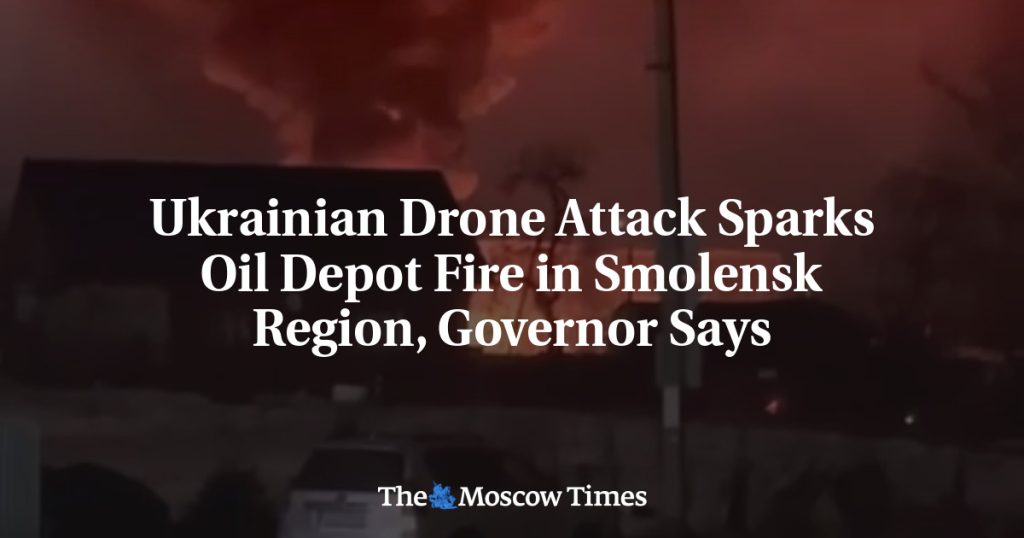A drone attack by Ukrainian forces resulted in a fire at an oil depot in Russia’s Smolensk region, according to authorities. The Governor of the Smolensk region, Vasily Anokhin, confirmed that Russian air defense systems thwarted the attack, with the wreckage of one drone causing a fuel spill and subsequent fire at the oil depot in the Yartsevo district. Emergency services were on the scene, and there was no immediate threat to residential buildings in the area. The attack comes amidst heightened tensions between Russia and Ukraine, with the Russian Defense Ministry reporting the downing of 68 Ukrainian drones overnight, including 10 over the Smolensk region located over 100 kilometers north of Ukraine and bordering Belarus.
The Moscow Times, an independent journalism outlet in Russia, has faced challenges as the country’s Prosecutor General’s Office has labeled it as “undesirable” and a “foreign agent,” threatening their staff with prosecution. The outlet continues to strive for accurate and unbiased reporting on Russia despite attempts to silence them. The Moscow Times is calling for support from readers to help sustain their work in the face of repression. The outlet is committed to defending open, independent journalism and is grateful for any support that can be provided, no matter how small. The monthly contributions from readers will aid in maintaining the outlet’s efforts to provide accurate news coverage on Russia.
The drone attack on the oil depot in the Smolensk region highlights the ongoing conflict between Ukraine and Russia, with tensions escalating in the aftermath of various incidents. The attack by Ukrainian drones has been met with swift response from Russian air defense systems, resulting in the downing of multiple drones overnight, including those over the Smolensk region. The incident underscores the volatile situation in the region, with both countries engaged in military activities that pose a threat to stability and security. The attack at the oil depot has caused a fuel spill and fire, necessitating the intervention of emergency services to contain the situation.
The escalation of tensions between Russia and Ukraine has led to increased military activities and provocations on both sides, further complicating the already strained relations between the two countries. The downing of Ukrainian drones over Russian territory signifies a shift in tactics by Ukrainian forces, utilizing unmanned aerial vehicles to target key installations such as the oil depot in the Smolensk region. The response from Russian air defense systems highlights the readiness and capability of the country to defend its territory from external threats. The incident serves as a reminder of the ongoing conflict in the region and the potential for further hostilities between the two nations.
The Moscow Times’ plea for support reflects the challenges faced by independent media outlets in Russia, where government crackdowns on dissenting voices have become increasingly common. The labeling of The Moscow Times as an “undesirable” organization and a “foreign agent” is part of a broader campaign to suppress independent journalism and silence critical perspectives on the government’s actions. Despite these obstacles, The Moscow Times remains steadfast in its commitment to providing accurate and unbiased reporting on Russia, highlighting the importance of defending open journalism in the face of repression. By supporting outlets like The Moscow Times, readers can contribute to the preservation of free speech and the dissemination of reliable information in challenging environments.
In conclusion, the drone attack on the oil depot in the Smolensk region, attributed to Ukrainian forces, has sparked a fire and fuel spill, prompting Russian air defense systems to neutralize the threat. The incident underscores the ongoing conflict between Russia and Ukraine, with tensions escalating and military activities intensifying. The Moscow Times, an independent journalism outlet in Russia, is facing challenges as it continues to report on critical issues despite government restrictions. The outlet is calling for support from readers to sustain its work and uphold the principles of open, independent journalism in the face of repression. The incident in the Smolensk region and the response from Russian authorities serve as a reminder of the fragile situation in the region and the need for responsible reporting to shed light on complex geopolitical dynamics.















